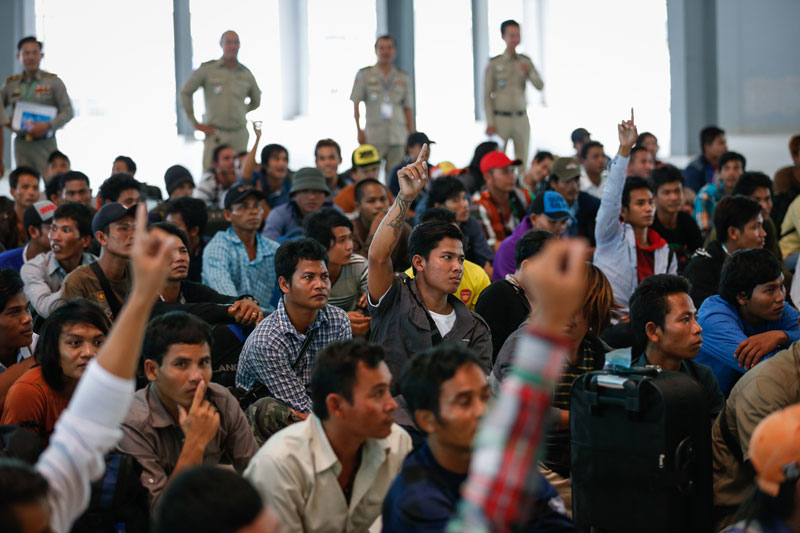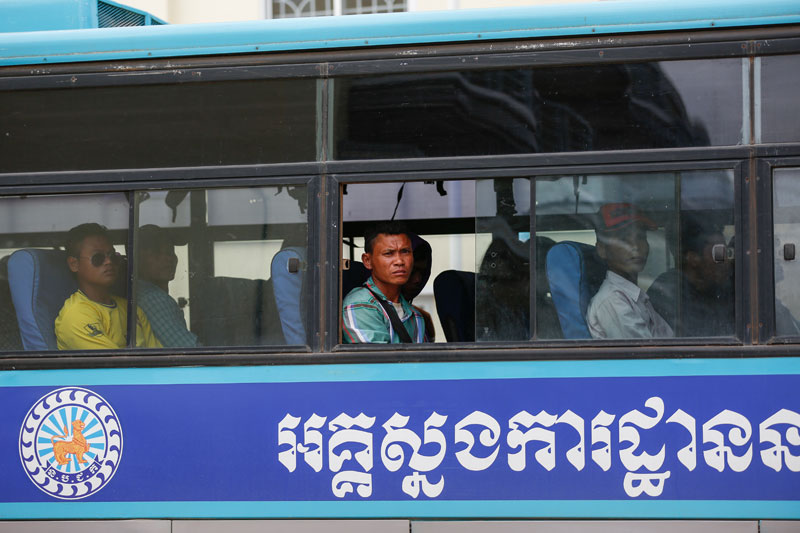A group of 230 fishermen who had been trapped in Indonesia returned to Cambodia on Thursday, many of them after being released from slavery on Thai-captained fishing vessels.
More than 300 Cambodian fishermen have been repatriated from Indonesia in the past two months, including Thursday’s group, following a moratorium on foreign fishing boats implemented by the Indonesian government in November in an effort to better regulate the unruly sector.

The moratorium forced Thai-captained boats to dock and, along with an investigation by The Associated Press, led to the discovery of thousands of migrant workers from Burma, Cambodia and Thailand forced to toil on the vessels.
Ninety-seven fishermen returned to Cambodia from the Indonesian island of Benjina in May and June after being subjected to slave-like conditions for months or years at a time. Many said they had been smuggled into Thailand on the pretext of being set up with well-paying jobs, before being forced to work on the boats.
The men repatriated Thursday arrived from the island of Ambon after Cambodian diplomats and Indonesia’s Fisheries Ministry negotiated their return with the PT Maribu Industries Group, a company representing the Thai boats that the men were working on, many in slave-like conditions.
At Phnom Penh International Airport on Thursday, Interior Ministry Secretary of State Chou Bun Eng—general secretary of the National Committee to Lead the Suppression of Human Trafficking—said a lack of job opportunities in the country was not to blame for migrant laborers illegally crossing the border.
“You have to understand, even though in Cambodia or other bigger countries there are people who migrate [for jobs], it doesn’t mean there are no jobs for them in their country,” she said. “It’s their choice. When they think elsewhere can offer them a higher salary, they make a choice.”
Ms. Bun Eng, who addressed the media as the hundreds of returning fishermen boarded waiting buses to take them to the Chroy Changva district office, added that she was not sure how many Cambodian fishermen were still stranded in Indonesia.
“We cannot estimate how many are remaining in Indonesia because they go illegally,” she said.
Dy The Hoya, program officer for migration and trafficking issues at the Community Legal Education Center, said that Ms. Bun Eng’s statement obscured the true obstacles facing unskilled laborers who chose to migrate for work.
“Most of them come from rural areas where their only option is farming,” he said.
“The Cambodian government does not have the capacity to help these people get jobs here. If it did, if they had received vocational training, they would not have gone to Thailand in the first place. They don’t have any options for training. That’s why they go to Thailand.”
Mr. The Hoya acknowledged that the Labor Ministry does operate vocational training centers and job centers, but said they were inadequate. Without proper training to upgrade their skills, Mr. The Hoya said that unskilled laborers seek employment in Thailand because they can earn more money there than in Cambodia.

Sara Piazzano, country director of the U.S.-funded Counter-Trafficking in Persons Project, said that additional training to upgrade workers’ skills here would help to protect them from being forced onto fishing boats.
“The most at-risk workers are unskilled,” she said. “I think there needs to be more information on employment opportunities, and more training would protect the workers by making them less vulnerable.”
Returned fisherman Boeun Boeuy, from Siem Reap province, said he had no land to farm and went to Thailand for work because it was his only way to find a job.
“Working on the boat was not easy; we worked in rain, mud and sunshine,” he said. “They forced us to work and work because they wanted a lot of fish.”
The 230 fishermen received their salaries and a free flight home after the Indonesian government and Cambodian Embassy in Jakarta intervened, but those who spoke to reporters said the ordeal was not worth the trouble.
Mey Kim, 36, from Kompong Thom province, said that he had been told he would be fishing in Thai waters, but the boat left for Indonesia and he was stuck on it for two years.
“We had to work day and night and sometimes only got 30 minutes of sleep,” he said. “I don’t want to go again.”



